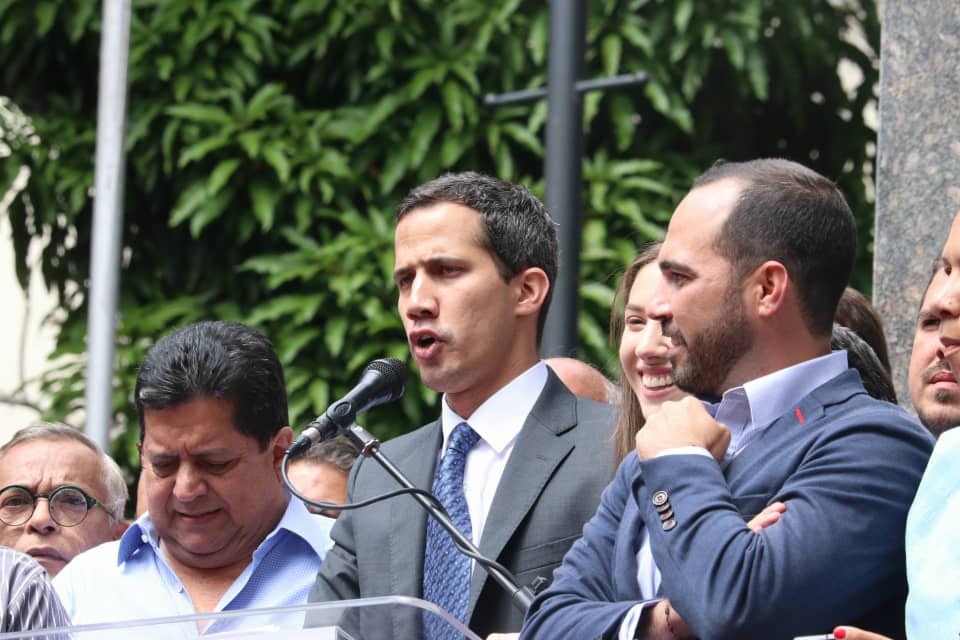
CARACAS, Venezuela – Venezuelan opposition leader Juan Guaido took his campaign for change to one of the country’s most populous states on Saturday, while supporters of the man he is trying to oust, President Nicolas Maduro, held a rival demonstration in the capital after another nationwide blackout.
Guaido, the U.S.-backed leader of the opposition-controlled National Assembly, made several stops in Miranda state near Caracas, delivering trademark denunciations of Maduro’s government and promises of a better life for Venezuela’s struggling population. Speaking from podiums in the street with his shirt sleeves rolled up, the 35-year-old politician drew applause when he said even bigger protests will be held on April 6 as the opposition intensifies its push to topple Maduro.
“Are you afraid?” Guaido asked at a stop in the town of San Antonio de Los Altos.
“No,” the crowd roared.
The opposition chief acknowledged power outages and other hardships in Venezuela as well as pressure from Maduro’s embattled government, which retains the pivotal support of the nation’s military leadership.
Meanwhile, backers of Maduro gathered for what was billed as an “anti-imperialist” rally in the capital on Saturday.
As at Guaido’s rallies, some demonstrators at the pro-Maduro rally held Venezuelan flags and said they wanted to save the country. They filed toward the rally point, wearing red clothing associated with the socialist movement started by the late Hugo Chavez and reciting revolutionary slogans such as: “Always loyal! Never traitors!”
Diosdado Cabello, a leading pro-government politician, gave a fiery speech, mocking the opposition for its hopes that Maduro would quickly fall and accusing its leaders of “pretending to be democrats.”
Such dueling demonstrations have become a pattern in past weeks as Venezuela’s opposing factions vie for control of a country that has endured economic turmoil and a deepening humanitarian crisis. The situation got even worse this month because of several nationwide blackouts, most recently on Friday evening. The outages often knock out water pumps and communications for millions, forcing schools and businesses to close and cutting people off from family and friends.
Power returned to many areas on Saturday morning, but more outages struck on Saturday night, suggesting blackouts are becoming routine for much of the population.
Maduro blames the blackouts on U.S.-directed sabotage, an allegation that Guaido routinely dismisses as the desperate talk of a government that has presided over the collapse of infrastructure in a country which was once among the wealthiest in Latin America.
“They don’t dare tell the truth,” Guaido said. “Because to tell the truth would be proof of their corruption.”
Maduro has responded to Guaido’s sharp criticisms with his own tough language, describing him as a “diabolical puppet” attempting to execute a coup plot on behalf of the United States, which has imposed sanctions on Venezuela.
Venezuelan security forces have detained Guaido’s chief of staff, but have yet to move directly against the opposition leader, whose claim to be interim president is backed by dozens of countries that say Maduro’s re-election last year was rigged.
On Saturday morning, anti-riot police used tear gas to disperse several small groups of opposition supporters, including in areas where government loyalists were active.
As both sides tried to steer public opinion in their favour, Guaido described his anti-government movement as “Operation Liberty,” while Maduro said he was leading a campaign “in defence of liberty.”
The rallies came a day after the International Federation of Red Cross and Red Crescent Societies said it is poised to deliver aid to Venezuela next month. The humanitarian group says it will remain neutral and has warned both sides in the Venezuelan conflict not to interfere with the aid distribution.